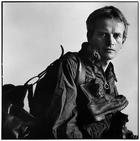
Charles Bruce Chatwin (13 May 1940 – 18 January 1989) was an English writer whose best known works are In Patagonia (1977) and The Songlines (1987).[1] Although he was often referred to as a travel writer, a term he eschewed,[2] Chatwin was also a novelist and a journalist who interviewed figures such as Indira Gandhi and André Malraux for the Sunday Times Magazine. He won the James Tait Black Memorial Prize for his novel On the Black Hill (1982)[3] and his novel Utz (1988) was shortlisted for the Man Booker Prize.[4] In 2008 The Times named Chatwin #46 on their list of "50 Greatest British Writers Since 1945".[5]
With the publication of In Patagonia, an account of his trip to the region and the stories of people who lived there, Chatwin's work invigorated the genre of travel writing.[6] In The New York Times, Andrew Harvey wrote, "Nearly every writer of my generation in England has wanted, at some point, to be Bruce Chatwin; wanted, like him, to talk of Fez and Firdausi, Nigeria and Nuristan, with equal authority; wanted to be talked about, as he is, with raucous envy; wanted above all to have written his books."[7]
Chatwin's travels often served as inspiration for his work and he was often described as a travel writer, although he did not see himself as one. When his book The Songlines was nominated for the Thomas Cook Travel Award, he requested that it be withdrawn from consideration, stating the work was fictional.[8] Nor did he see himself as a novelist ("I don't quite know the meaning of the word novel," he said).[9] Instead he considered himself a storyteller, interested in bringing to light unusual tales.[10]
Married and bisexual, Chatwin was one of the first prominent men in Great Britain known to have contracted HIV and died of an AIDS-related illness, although he hid the facts of his illness.[11] He gave various explanations for his poor health, including malaria and a fungal infection.[12][13] Following his death he was criticised for not publicly disclosing his diagnosis.[14] This led critics to question the truthfulness of his work.




